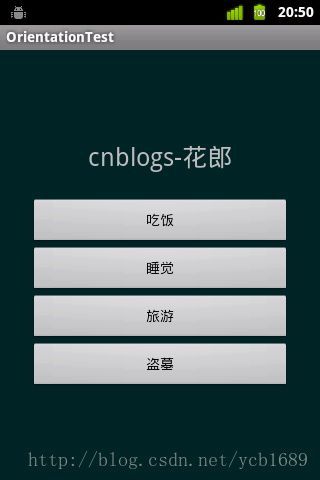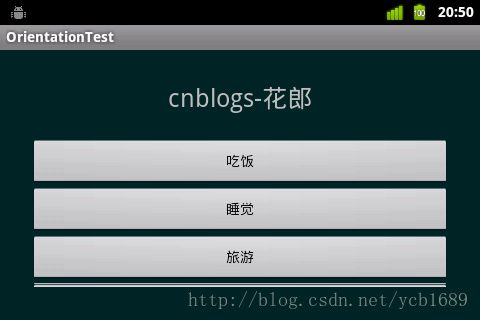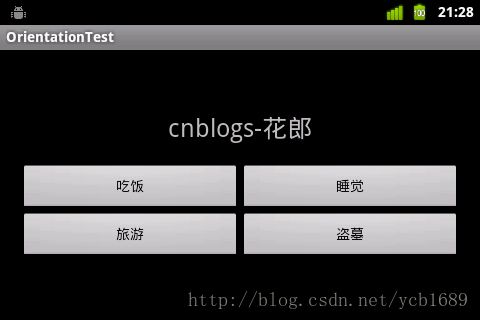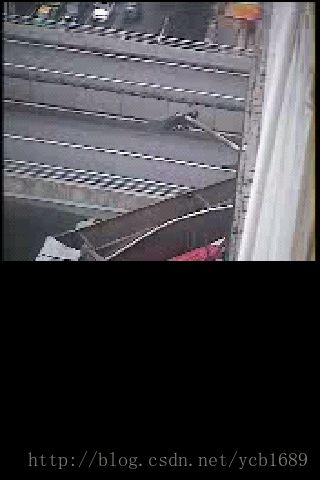layout的横竖屏处理
一、layout-land和layout-prot的区别与使用
默认情况下,创建的Android项目里只有一个layout文件夹,尽管这样也可以横竖屏切换用,但是某些布局横屏过后闲的格外的丑,如下图
横屏过后就显示的不全了,有时候看着比较纠结。所以需要在横屏的使用重新载入新的布局文件
解决办法是:先把layout目录删除了,因为可能跟之后的产生冲突。然后新建两个文件夹,一个layout-land,另一个是layout-prot。
layout-land:存放横屏布局文件,如main.xml。布局名字与layout-prot的一样
layout-prot:存放竖屏布局文件,名字与layout-land的一样
剩下的事情就可以交由手机处理了,手机会自动处理横竖屏时布局之间的切换(前提是你的手机支持横竖屏,并且:设置-显示-自动旋转屏幕)
先看看两个布局文件吧,Activity可以不用管
layout-land/main.xml
<?xml version="1.0" encoding="utf-8"?>
<LinearLayout xmlns:android="http://schemas.android.com/apk/res/android"
android:layout_width="match_parent"
android:layout_height="match_parent"
android:orientation="horizontal" >
<LinearLayout
android:orientation="vertical"
android:layout_width="fill_parent"
android:layout_height="wrap_content"
android:layout_gravity="center"
android:paddingLeft="20dip"
android:paddingRight="20dip"
>
<TextView
android:text="cnblogs-花郎"
android:layout_width="wrap_content"
android:layout_height="wrap_content"
android:layout_gravity="center"
android:layout_marginBottom="20dip"
android:textSize="24.5sp"
/>
<TableLayout
android:layout_width="wrap_content"
android:layout_height="wrap_content"
android:layout_gravity="center"
android:stretchColumns="*"
>
<TableRow>
<Button
android:text="吃饭"
/>
<Button
android:text="睡觉"
/>
</TableRow>
<TableRow>
<Button
android:text="旅游"
/>
<Button
android:text="盗墓"
/>
</TableRow>
</TableLayout>
</LinearLayout>
</LinearLayout>
layout-prot/main.xml
<?xml version="1.0" encoding="utf-8"?>
<LinearLayout xmlns:android="http://schemas.android.com/apk/res/android"
android:layout_width="fill_parent"
android:layout_height="fill_parent"
android:background="#3500ffff"
android:padding="30dip"
android:orientation="horizontal" >
<LinearLayout
android:orientation="vertical"
android:layout_height="wrap_content"
android:layout_width="fill_parent"
android:layout_gravity="center"
>
<TextView
android:text="cnblogs-花郎"
android:layout_width="wrap_content"
android:layout_height="wrap_content"
android:layout_gravity="center"
android:layout_marginBottom="25dip"
android:textSize="24.5sp"
/>
<Button
android:layout_width="fill_parent"
android:layout_height="wrap_content"
android:text="吃饭"
/>
<Button
android:layout_width="fill_parent"
android:layout_height="wrap_content"
android:text="睡觉"
/>
<Button
android:layout_width="fill_parent"
android:layout_height="wrap_content"
android:text="旅游"
/>
<Button
android:layout_width="fill_parent"
android:layout_height="wrap_content"
android:text="盗墓"
/>
</LinearLayout>
</LinearLayout>
下面有图有真相,是横屏时的布局。
注:切换模拟器的命令式CTRL+F12
这里有一点需要注意的是,横竖屏切换的生命周期的问题。
在上面的那种情况下,横竖屏切换的时候,会销毁Activity后然后再次创建。
在不加入任何设置的时候,它的生命周期是这样的:
onCreate-onStart-onResume 开始运行时
onPause-onStop-onDestroy-onCreate-onStart-onResume 横竖屏切换的时候都是这样
当在AndroidManifest.xml中的activity标签中加入了:
android:configChanges="orientation|keyboardHidden"
或者android:configChanges="orientation"后
横竖屏切换就不需要重新载入了,也就是说不用销毁Activity后再重新创建Activity了。
另外一种横竖屏切换时生命周期的样子是另外的样子,是与onConfigureChanges方法有关的,它的生命周期跟我的有些不同呢?
参考:http://hi.baidu.com/%C2%E4%C2%E4%E7%F7%E7%F7%B0%A1/blog/item/dcc19ce5a9c274cc2e2e2178.html
二、如何限定横屏或者竖屏?
有些人讨厌玩手机的时候横竖屏来回的切换,有些应用也限定了应用程序只使用横屏或者只使用竖屏,即使手机设置了“自动切换横竖屏”。比如“水果忍者”是不能竖屏的(双人模式除外了)
解决办法:只需要在AndroidManifest.xml的Activity标签中加入:android:screenOrientation="landscape"
android:screenOrientation="landscape"表示横屏或
android:screenOrientation="protrait"表示竖屏
这样,所设定的应用程序就只能是横屏或者竖屏了
三,横竖屏切换时关于Activity重新载入的问题(onConfigurationChanged()方法)
例如上面的那个例子,Activity每次横竖屏切换的时候是重新载入的,但是比如我们在玩游戏的时候切换了一下屏幕,我们不可能要重新玩起,所以需要有一种解决横竖屏切换的时候保存当前状态,不用重新载入的方法
解决方案:可以使用onConfigurationChanged方法,该方法可以在用户切换横竖屏的时候就不用重新执行onCreate方法了
提醒:这个方法的使用场景比如播放影音的时候转换了一下屏幕,如果是分别设置了两个布局的话,那么横竖屏要对应不同布局,也意味着还是要执行onCreate方法,所以布局最好是一个(不知对不对,求高手指点)
1、需要在AndroidManifest.xml中的对应的activity标签里加入
android:configChanges="orientation|keyboardHidden"
这条语句的意思是:横竖屏切换或者实体键盘推出合上的时候配置信息的改变
2、需要在AndroidManifest.xml中加入权限
<uses-permission android:name="andorid.permission.CHANGE_CONFIGURATION"/>
3、需要在横竖屏切换时共用的那个Activity里覆盖onConfigurationChanged方法,如下
@Override
public void onConfigurationChanged(Configuration newConfig) {
// TODO Auto-generated method stub
super.onConfigurationChanged(newConfig);
if(this.getResources().getConfiguration().orientation == Configuration.ORIENTATION_LANDSCAPE )
{
Toast.makeText(getApplicationContext(), "切换为横屏", Toast.LENGTH_SHORT).show();
}else if(this.getResources().getConfiguration().orientation == Configuration.ORIENTATION_PORTRAIT)
{
Toast.makeText(getApplicationContext(), "切换为竖屏", Toast.LENGTH_SHORT).show();
}
}
这里需要说的事,代码中的if语句是判断当前设备是横屏还是竖屏,然后有其对应的操作。之前竟然在屏幕切换的时候设置不同的布局,虽然能够显示不同的布局,但是这个方法就已经毫无意义了,因为横竖屏切换到不同的布局我们可以用上面的第一种方法,而这种最好只是对应一个布局吧,然后在里面进行横竖屏时候的其他操作,防止了重新载入
下面还是看一个例子吧,下面的是一个播放rtsp流的的例子
package com.loulijun.demo07;
import android.app.Activity;
import android.content.res.Configuration;
import android.net.Uri;
import android.os.Bundle;
import android.view.Window;
import android.view.WindowManager;
import android.widget.Toast;
import android.widget.VideoView;
public class Demo07Activity extends Activity {
private VideoView video;
private String rtspUrl = "rtsp://218.205.231.149:554/mobile/1/2CBE124B67C85A59/48f313651199829e.sdp?id=guest&t=1305313158&en=f2ed024c7963e179f65c65689fdd9887&rs=wap";
@Override
public void onCreate(Bundle savedInstanceState) {
super.onCreate(savedInstanceState);
setContentView(R.layout.main);
video = (VideoView)findViewById(R.id.play);
video.setVideoURI(Uri.parse(rtspUrl));
video.requestFocus();
video.start();
}
@Override
public void onConfigurationChanged(Configuration newConfig) {
// TODO Auto-generated method stub
super.onConfigurationChanged(newConfig);
if(this.getResources().getConfiguration().orientation == Configuration.ORIENTATION_LANDSCAPE )
{
Toast.makeText(getApplicationContext(), "切换为横屏", Toast.LENGTH_SHORT).show();
}else if(this.getResources().getConfiguration().orientation == Configuration.ORIENTATION_PORTRAIT)
{
Toast.makeText(getApplicationContext(), "切换为竖屏", Toast.LENGTH_SHORT).show();
}
}
}
main.xml
<?xml version="1.0" encoding="utf-8"?>
<LinearLayout xmlns:android="http://schemas.android.com/apk/res/android"
android:layout_width="fill_parent"
android:layout_height="fill_parent"
android:orientation="vertical" >
<VideoView
android:id="@+id/play"
android:layout_width="fill_parent"
android:layout_height="wrap_content"
android:layout_gravity="center"
/>
</LinearLayout>
这里需要说一下VideoView的全屏显示的问题,横屏后右边总是空出一块黑色区域,即使通过WindowManager的方式也不能解决,索性只能设置布局为居中显示了,至少好看些
所以只是在清单文件中加入了样式:android:theme="@android:style/Theme.NoTitleBar.Fullscreen"
这种方式在播放视频的时候不能全屏,希望大牛们可以提出自己的解决方案
AndroidManifest.xml
<?xml version="1.0" encoding="utf-8"?>
<manifest xmlns:android="http://schemas.android.com/apk/res/android"
package="com.loulijun.demo07"
android:versionCode="1"
android:versionName="1.0" >
<uses-sdk android:minSdkVersion="8" />
<application
android:icon="@drawable/ic_launcher"
android:label="@string/app_name" >
<activity
android:label="@string/app_name"
android:configChanges="orientation|keyboardHidden"
android:theme="@android:style/Theme.NoTitleBar.Fullscreen"
android:name=".Demo07Activity" >
<intent-filter >
<action android:name="android.intent.action.MAIN" />
<category android:name="android.intent.category.LAUNCHER" />
</intent-filter>
</activity>
</application>
<uses-permission android:name="andorid.permission.CHANGE_CONFIGURATION"/>
<uses-permission android:name="android.permission.ACCESS_WIFI_STATE"/>
<uses-permission android:name="android.permission.ACCESS_NETWORK_STATE"/>
<uses-permission android:name="android.permission.INTERNET"/>
</manifest>
看看运行效果吧
文章精选:
http://www.blogjava.net/zh-weir/archive/2010/01/24/310617.html
http://www.cnblogs.com/hibraincol/archive/2010/09/18/1829862.html
http://hi.baidu.com/gaogaf/blog/item/6ef7184c3b20bff6d72afc2a.html




